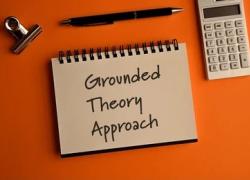A Comprehensive Step-by-Step Guide to Creating a Grounded Theory Research Design
In the dynamic realm of qualitative research, Grounded Theory stands out as a powerful and nuanced approach, allowing researchers to uncover patterns, relationships, and theories directly from the data.
If you are keen to learn about the intricate landscape of developing a Grounded Theory Research Design, you are in the right place. This step-by-step guide will walk you through the essential stages of this inductive research methodology, offering insights into theoretical sensitivity, data collection methods, and the intricate process of constant comparison and theoretical sampling.
Whether you are a novice researcher or seasoned academic, this guide promises to demystify the intricacies of Grounded Theory, empowering you to craft a research design that captures the essence of your chosen phenomenon. This blog post mainly covers the following critically important area:
- Importance of grounded theory research design
- Strengths and limitations of grounded theory research design
- Why do researchers select a grounded theory research design?
- When should you use grounded theory research design?
- Is the grounded theory research design qualitative or quantitative in nature?
- What are the key stages of the grounded theory research process?
- What are the most commonly used data collection methods in grounded theory research design?
- What are the key steps involved in grounded theory design?
- How many participants used to be engaged in grounded theory research?
- How long should be a grounded theory research study?
These topics are discussed here one by one in detail.
Importance of grounded theory research design
The importance of grounded theory research design lies in its unique contributions to qualitative research with a systematic and rigorous approach to theory development offering several key benefits and contributions to the field of social sciences. It holds significant importance in various aspects of research and knowledge production. Grounded theory is highly valued for several key reasons:
- Theory Development: Grounded theory is distinctive for its emphasis on generating theories directly from the data. This allows researchers to develop rich, contextually grounded theories that emerge organically from the complexities of the studied phenomena. This is particularly valuable in areas where existing theories are limited or absent.
- Contextual understanding: It provides a deep and contextual understanding of social phenomena by capturing the nuances and intricacies of participants’ experiences within their natural settings. This contributes to a more holistic comprehension of the subject matter.
- Flexibility and adaptability: Grounded theory’s flexible and adaptive nature makes it suitable for a wide range of research questions and settings. Researchers can adjust their focus, refine their theories, and iteratively collect and analyze data to accommodate the evolving nature of the research process. It is not a rigid methodology; it can be adapted to suit different research questions, data sources, and theoretical interests. This flexibility makes it applicable to a wide range of research contexts.
- Bridge between data and theory: It serves as a bridge between raw data and theoretical frameworks. The iterative process of coding and constant comparison allows for the development of concepts and categories that, when interconnected, form a coherent and grounded theory.
- Applicability across disciplines: Grounded theory is not confined to a specific discipline. Its adaptability has led to its widespread application in sociology, psychology, nursing, management studies, education, and various other fields.
- In-depth exploration of social processes: Grounded theory is particularly effective in exploring social processes, interactions, and the development of social structures. It enables researchers to uncover patterns and dynamics that may not be apparent through other research methodologies. Through systematic analysis of qualitative data, grounded theory can reveal underlying patterns, connections, and processes that might be overlooked by other methods. This can lead to a deeper understanding of complex social dynamics and human behavior.
- Empirical rigor: The methodology is rooted in empirical evidence, ensuring that the theories developed are firmly grounded in the data collected. This enhances the credibility and rigor of the research findings. It emphasizes rigor and methodological quality, ensuring that the theories generated are grounded in robust data analysis and transparent procedures.
- Generation of mid-range theories: Grounded theory often results in the development of mid-range theories—those that are abstract enough to be applicable beyond the specific study but still rooted enough to offer practical insights. This balance enhances the theory’s relevance.
- Discovery of unanticipated findings: The inductive nature of grounded theory allows for the discovery of unanticipated findings. Researchers are not confined by preconceived notions, allowing for the exploration of unexpected patterns and relationships.
- Guidance for further research: Grounded theory studies often provide valuable insights that can guide further research and exploration. The theories developed become a foundation for building upon existing knowledge and addressing new research questions. It is used across various disciplines, including sociology, nursing, education, psychology, management, and health sciences. Its versatility allows for cross-disciplinary fertilization and knowledge sharing.
In essence, the importance of grounded theory research design lies in its ability to uncover, interpret, and contribute to the understanding of complex social phenomena in a way that is both systematic and grounded in the lived experiences of those being studied. It is important for its role in uncovering the depth and complexity of social phenomena, contributing to the development of nuanced and empirically grounded theories that hold relevance across diverse fields of study.
Strengths and limitations of grounded theory research design
Grounded theory research design boasts several strengths, such as its inductive nature, which allows for the exploration of complex social phenomena without imposing preconceived notions. The methodology’s flexibility and adaptability make it suitable for various research questions and settings, fostering a dynamic and iterative research process. However, its strengths are accompanied by limitations, including the potential for subjectivity in the researcher’s interpretations, the time-consuming nature of the iterative process, and the challenge of achieving theoretical saturation. Additionally, the methodology may require a steep learning curve for novice researchers, and its rigorous coding and constant comparison processes demand careful attention to maintain methodological rigor. But first of all we discuss the strengths of grounded theory research design:
Strengths of Grounded Theory Research Design:
- Flexibility and adaptability: Grounded theory is flexible and can be adapted to various research questions and settings. Its iterative nature allows researchers to adjust their focus and refine theories throughout the research process.
- Theory development: One of its primary strengths is the systematic development of theories directly from the data, providing a comprehensive understanding of the studied phenomena.
- Contextual richness: Grounded theory captures the contextual richness of participants’ experiences, allowing for a deep exploration of social processes within their natural settings.
- In-depth exploration: It enables in-depth exploration of social phenomena, uncovering patterns, relationships, and dynamics that might be overlooked by other research designs.
- Generativity: The methodology is generative, often leading to the discovery of new concepts and theories that contribute to the existing body of knowledge.
- Holistic understanding: Grounded theory provides a holistic understanding of the research topic, considering multiple perspectives and aspects of the phenomena under investigation.
- Applicability across disciplines: Its adaptability makes it applicable across various disciplines, including sociology, psychology, healthcare, education, and more.
- Naturalistic inquiry: Grounded theory supports naturalistic inquiry, allowing researchers to study phenomena in their real-world context without imposing artificial constraints.
- Practical relevance: The theories developed often have practical relevance, offering insights that can inform policy, practice, or further research.
- Rigor in analysis: The constant comparative method and systematic coding procedures contribute to the rigor and reliability of the analysis process.
Despite these strengths, there are certain limitations of grounded theory research design. Here we discuss the limitations of grounded theory research design:
Limitations of Grounded Theory Research Design:
- Subjectivity and bias: The researcher’s subjectivity can influence the data collection and analysis, potentially introducing bias into the findings. Moreover, potential biases and interpretations can influence the emerging theory, requiring careful reflexivity and transparency.
- Time-consuming: Grounded theory research can be time-consuming due to the iterative nature of the process, including data collection, coding, and theory development. The iterative data analysis and theory development process can be lengthy and demanding.
- Resource intensive: The methodology may require significant resources in terms of time, personnel, and funding, particularly for extensive data collection and analysis.
- Complexity in analysis: The complexity of data analysis may pose challenges for researchers, especially those new to the methodology. Proper training and experience are crucial for effective implementation. Ensuring no new information emerges from data collection and analysis can be difficult.
- Potential for overemphasis on negative cases: There’s a risk of overemphasizing negative cases, especially if they are seen as challenging or contradicting the emerging theory. This could lead to a skewed representation of the data.
- Potential for overfitting: In some cases, researchers may become too immersed in the data, leading to overfitting of the theory to the specific study context and compromising its generalizability.
- Limited generalizability: Grounded theory often results in theories that are context-specific, limiting their generalizability to broader populations or settings. Findings might be specific to the studied context and population, making wider generalizations challenging.
- Ethical considerations: Ethical considerations, such as ensuring participant confidentiality and informed consent, must be carefully addressed, especially when dealing with sensitive topics.
Despite these limitations, grounded theory remains a valuable research methodology for generating new theories and understanding complex social phenomena. Researchers must be aware of the strengths and limitations of this methodology when designing and conducting their studies.
Understanding both the strengths and limitations of grounded theory research design is essential for researchers to make informed decisions about its suitability for their specific research questions and contexts. Despite these limitations, grounded theory remains a powerful qualitative research approach, offering valuable insights and contributing to the understanding of complex social phenomena. It is important to consider both the strengths and limitations of grounded theory research design when choosing a research methodology. Grounded theory can be a valuable tool for generating new knowledge and understanding, but it is not appropriate for all research questions or contexts.
Why do researchers select a grounded theory research design?
Researchers select a grounded theory research design for a variety of reasons, depending on their specific research goals and the nature of the phenomenon they are studying. Here are some key reasons why grounded theory is a popular choice:
- Exploratory nature: Grounded theory is well-suited for researchers aiming to explore and understand a relatively uncharted or complex phenomenon. Its inductive approach allows for the emergence of novel insights and theories directly from the data.
- Theory development: Researchers opt for grounded theory when the goal is to develop new theories grounded in the data rather than testing existing theories. This is particularly valuable when investigating social processes, interactions, and complex phenomena where existing theories may be limited.
- Richness and depth of understanding: Grounded theory facilitates a deep and nuanced understanding of the social world. By focusing on the participants’ perspectives and experiences, researchers can uncover rich and contextually relevant insights that contribute to a comprehensive understanding of the studied phenomenon.
- Flexibility and adaptability: The flexibility of grounded theory makes it suitable for a variety of research questions and settings. Researchers can iteratively collect and analyze data, adjusting their focus as the study progresses, allowing for a more adaptive and responsive research process.
- Participant-centric approach: Grounded theory emphasizes the importance of understanding the world from the participants’ point of view. Researchers choose this methodology when they seek to capture the subjective meanings, interpretations, and experiences of individuals involved in the phenomenon. This allows researchers to gain deeper insights into how individuals perceive and interpret the phenomenon under study.
- Holistic exploration: Grounded theory enables a holistic exploration of social phenomena. By using methods like constant comparison and theoretical sampling, researchers can delve into various aspects of the phenomenon, examining patterns and relationships in a systematic manner.
- Openness to unexpected findings: Researchers may choose grounded theory when they are open to and interested in discovering unexpected or unanticipated findings. The methodology allows for the emergence of new concepts and categories that may not have been initially considered.
- Contextual relevance: Grounded theory is particularly valuable when researchers aim to develop theories that are contextually relevant and grounded in the specific settings and experiences of the participants. This ensures that the theories generated have practical applicability. This allows researchers to develop theories that are sensitive to the specific cultural, historical, and situational factors influencing the phenomenon under study.
- In-depth interviews and qualitative data: Grounded theory often involves in-depth interviews and the analysis of qualitative data. Researchers choose this design when qualitative data, such as narratives, stories, or detailed accounts, are crucial for understanding the complexities of the phenomenon under investigation. Its systematic approach to data analysis and theory development has provided valuable tools and frameworks for conducting rigorous and insightful qualitative research.
- Application across disciplines: Grounded theory’s adaptability makes it applicable across various disciplines, including sociology, psychology, nursing, education, and more. Researchers from diverse fields select grounded theory when exploring complex social phenomena that transcend disciplinary boundaries.
In summary, researchers select a grounded theory research design when they prioritize inductive exploration, seek to develop theories directly from the data, value participant perspectives, and aim for a comprehensive understanding of complex social phenomena in a flexible and adaptive manner. Hence, researchers may choose a grounded theory research design for several compelling reasons, each highlighting the strengths and advantages of this qualitative methodology:
When should you use grounded theory research design
Grounded theory research design is a powerful tool for researchers, but it’s not universally applicable. It is particularly well-suited for certain research situations and objectives. Here are key scenarios when you might choose to use grounded theory and where it’s particularly well-suited:
- Exploring new or emerging phenomena: When there’s little existing research or the available theories are inadequate, grounded theory can help develop new explanations and insights. It is ideal when you are exploring a relatively uncharted or poorly understood phenomenon. Its inductive approach allows for the generation of new theories directly from the data.
- Understanding complex social processes: Grounded theory’s iterative nature allows for in-depth exploration of complex phenomena with multiple factors and diverse perspectives. When studying complex social settings, interactions, or processes, grounded theory excels in unraveling intricate patterns and relationships. It is valuable for understanding the dynamics of human behavior within social contexts.
- Adapting to diverse research contexts: Grounded theory’s flexibility allows tailoring the methodology to different research questions, data sources, and theoretical interests.
- Promoting transparency and reflexivity: Grounded theory encourages researchers to be transparent about their process and biases, leading to more trustworthy findings and a nuanced understanding of limitations.
- Building knowledge across disciplines: Grounded theory facilitates cross-disciplinary collaboration and knowledge sharing, leading to a broader understanding of human behavior and social phenomena. Its adaptability makes it an excellent choice for researchers working across different disciplines. It can be applied in sociology, psychology, healthcare, education, business, and other fields to explore diverse social phenomena.
Here are some specific situations where choosing grounded theory research design might be advantageous:
- Limited existing research on a new phenomenon.
- Existing theories are inadequate or incomplete.
- Understanding diverse perspectives on a complex phenomenon.
- Exploring a specific context or population in detail.
- Open-ended research question with potential for new discoveries.
Therefore, choosing a grounded theory research design requires careful consideration of the research question, available resources, and the potential benefits and limitations of this methodology.
Is the grounded theory research design qualitative or quantitative in nature?
Grounded theory research design is inherently qualitative in nature. It is a qualitative research methodology that emphasizes the systematic collection and analysis of non-numerical data to develop theories grounded in the observed phenomena. It emphasizes the collection and analysis of qualitative data, such as interviews, observations, documents, and artifacts. The focus is on understanding the meaning and interpretations of the participants, rather than quantifying their responses or experiences.
While quantitative data can be incorporated into grounded theory research, it typically plays a supporting role. For example, quantitative data may be used to supplement qualitative findings or to provide additional context for the analysis. However, the primary focus of grounded theory remains on the qualitative data and the generation of theory from that data. Key qualitative aspects of grounded theory research design include:
- Inductive approach: Grounded theory starts with the collection and analysis of data without preconceived hypotheses, allowing theories to emerge organically from the observed patterns and themes.
- Data collection methods: Grounded theory commonly utilizes qualitative data collection methods such as in-depth interviews, observations, and document analysis. These methods capture the richness, depth, and context of the participants’ experiences.
- Emphasis on participant perspectives: The methodology places a strong emphasis on understanding the perspectives and meanings attributed by participants to the studied phenomenon, contributing to a subjective and holistic understanding.
- Constant comparative method: Grounded theory employs the constant comparative method, which involves continuously comparing data to identify similarities and differences. This iterative process is central to developing categories and generating theories.
- Theoretical Sampling: Theoretical sampling, a key component of grounded theory, involves purposeful selection of data sources based on emerging theoretical insights. This helps refine and expand the developing theories.
- Qualitative data analysis: Data analysis in grounded theory is qualitative and involves open coding, axial coding, and selective coding. These coding processes categorize and organize data, leading to the development of conceptual frameworks.
- Development of concepts and categories: Grounded theory focuses on developing concepts and categories that emerge from the data. These form the basis for constructing theories that explain the observed phenomena.
- Rich and contextual understanding: Grounded theory aims to provide a rich and contextual understanding of the studied phenomenon, capturing the intricacies and context-specific aspects of social processes.
While grounded theory is qualitative, it doesn’t dismiss the importance of rigor and systematic analysis. It offers a robust framework for generating theories that have practical implications and can contribute to a deeper comprehension of complex social phenomena. However, it’s important to note that grounded theory is not always strictly qualitative. Some variations, such as “mixed grounded theory,” incorporate quantitative data to a greater extent. Additionally, researchers may use quantitative data to measure specific concepts or variables that emerge from the qualitative analysis.
Overall, while grounded theory research design is primarily qualitative, its approach to data collection and analysis aligns more closely with the principles and goals of qualitative research.
What are the key stages of grounded theory research process?
The grounded theory research process typically involves several key stages, each contributing to the systematic development of theories grounded in empirical data. These stages may vary slightly based on the specific variation of grounded theory being used (e.g., classic grounded theory, constructivist grounded theory), but the following outline provides a general overview:
- Formulating the research question:
- Define the research topic and identify the gap in existing knowledge.
- Formulate a clear research question that guides the data collection and analysis.
- Remain open to potential refinements and adjustments to the research question as the research progresses.
- Data collection:
- Select appropriate qualitative data collection methods, such as interviews, observations, document analysis, or focus groups.
- Ensure data collection methods are aligned with the research question and theoretical interests.
- Gather rich and diverse data that captures different perspectives and experiences.
- Data coding:
- Break down the data into discrete units of meaning and assign initial codes reflecting the content of each unit.
- Engage in open coding, identifying emerging themes and concepts without pre-existing theoretical frameworks. In open coding, the researcher reads through the data and identifies concepts and themes. These concepts and themes are then labeled with codes.
- Move into axial coding, establishing relationships between the codes and developing categories that capture the core concepts. In axial coding, the researcher develops relationships between the codes. These relationships can be hierarchical, causal, or conceptual.
- Refine the coding scheme through selective coding, focusing on the central category that integrates and explains the relationships between other categories. In selective coding, the researcher integrates the codes into a core category. The core category is the central concept or theme that emerged from the data.
- Data analysis and memo writing:
- Analyze the coded data, paying close attention to emerging themes, patterns, and relationships.
- Write detailed memos throughout the analysis process, reflecting on the data, interpretations, and emerging theory.
- Use memos to refine the coding scheme, develop theoretical propositions, and identify areas for further exploration.
- Theory development:
- Based on the coded data and analysis, formulate a comprehensive theory that explains the phenomenon under study.
- Ensure the theory is grounded in the data, logically coherent, and consistent with existing knowledge.
- Use memos and diagrams to visualize relationships between categories and refine the theoretical framework.
- Validation and refinement:
- Conduct member checks to seek feedback from participants and test the validity of the emerging theory.
- Compare the findings to existing literature and theoretical frameworks to identify points of convergence and divergence.
- Refine the theory based on the feedback and additional analysis, ensuring its comprehensiveness and explanatory power.
- Writing and dissemination:
- Write a clear and concise research report that details the research process, findings, and theoretical contributions.
- Disseminate the research findings through publications, presentations, and conferences to share knowledge and contribute to the scientific community.
Throughout these stages, it’s crucial to maintain:
- Reflexivity: Be aware of your own biases and how they might influence the research process.
- Transparency: Document your research decisions, interpretations, and theoretical development in detail.
- Rigor: Ensure the research process is systematic, thorough, and adheres to established qualitative research principles.
Remember, grounded theory is an iterative and dynamic process. The stages are not always linear, and researchers may move back and forth between them as needed. The key is to remain flexible, open-minded, and committed to generating a theory that is grounded in the data and provides a meaningful explanation of the phenomenon under study.
What are the most commonly used data collection methods in grounded theory research design?
Grounded theory research design employs a range of qualitative data collection methods that aim to capture the richness and complexity of participants’ experiences. The choice of methods depends on the nature of the research question, the studied phenomenon, and the researcher’s preferences. Here are some commonly used data collection methods in grounded theory:
- In-depth interviews: In-depth interviews are a primary and widely used method in grounded theory. These interviews are typically open-ended and semi-structured, allowing participants to share their experiences, perceptions, and interpretations of the phenomenon under investigation.
- Observations: Observational methods involve systematically watching and recording participants’ behaviors, interactions, and activities in natural settings. Observations provide firsthand insights into the context and dynamics of the studied phenomenon.
- Focus groups: Focus groups involve bringing together a small group of participants to discuss a specific topic guided by a facilitator. While less common than individual interviews in grounded theory, focus groups can offer insights into shared experiences and group dynamics.
- Documents and textual analysis: Analyzing documents, texts, or artifacts related to the studied phenomenon is a valuable data collection method. This could include analyzing written materials, organizational documents, or any text that provides relevant information.
- Visual data: Visual data, such as photographs, videos, or drawings, can be incorporated into grounded theory research. Visual methods can offer additional layers of meaning and contribute to a deeper understanding of participants’ experiences.
- Surveys and questionnaires (Less Common): While less common in grounded theory, surveys and questionnaires may be used to gather specific demographic or background information from participants. However, the focus is typically on open-ended responses that align with the grounded theory approach.
- Historical or archival data: Historical or archival data can provide insights into the evolution of the phenomenon over time. This may include analyzing historical documents, records, or artifacts relevant to the research question.
Researchers often use a combination of these methods to triangulate and deepen their understanding of the phenomenon. The iterative nature of grounded theory allows for flexibility in data collection, enabling researchers to adapt their strategies based on emerging insights and the evolving needs of the study. Ultimately, the most effective data collection method in grounded theory research is the one that provides the richest and most relevant data for developing a robust and grounded theory.
What are the key steps involved in grounded theory research design?
Developing a grounded theory research design involves a systematic process that integrates data collection, coding, and theory development. Below are the key steps involved in grounded theory research design:
- Identify the research problem: Clearly articulate the research problem or question that you aim to explore. Ensure that the problem is suitable for a grounded theory approach, often involving complex social processes or phenomena. Clearly identify the phenomenon or area you want to explore. Formulate a focused research question that guides data collection and analysis. Ensure the question is open-ended and allows for new insights and theory development.
- Literature Review (Optional): While grounded theory often starts with minimal preconceptions, you may conduct a preliminary literature review to understand existing knowledge about the topic. This can help you identify gaps and inform your research questions. Search for existing research on the topic to identify relevant theories, concepts, and research gaps. Be familiar with existing literature, but avoid getting trapped in pre-existing frameworks.
- Theoretical sensitivity: Develop theoretical sensitivity, a key concept in grounded theory. This involves cultivating an open and unbiased mindset to approach data without preconceived notions. Be ready to explore and understand the phenomenon from the participants’ perspectives.
- Select appropriate data collection methods: Choose qualitative data collection methods that align with your research question and theoretical interests. Consider using multiple methods, such as interviews, observations, and document analysis, for triangulation. Develop interview guides, observation protocols, or other data collection instruments. Pilot test the instruments to ensure clarity, flow, and effectiveness. Establish procedures for data collection, including recording, transcription, and data storage. Develop clear inclusion and exclusion criteria for participant selection. Use purposive sampling to ensure diverse perspectives and experiences are represented.
- Data Collection: Begin collecting data using appropriate qualitative methods such as in-depth interviews, observations, or document analysis. Data collection often occurs simultaneously with data analysis in grounded theory. Use theoretical sampling to purposefully select new data sources based on emerging theoretical insights. This is an iterative process that helps refine and expand emerging concepts and categories.
- Engage in Data Analysis: Employ a systematic approach to data analysis, such as open coding, axial coding, and selective coding. Use coding software or other tools to facilitate data management and analysis. Continuously revisit and refine the coding scheme as new insights emerge. Engage in open coding, where you systematically analyze the data line by line, identifying and labeling concepts or themes. This is the initial stage of coding and involves creating categories that represent the content of the data. Apply the constant comparative method by constantly comparing data within and across cases. This involves comparing incidents, categories, and themes to identify patterns and relationships. Continue refining codes as new data are collected. Then move to axial coding, where you begin to identify relationships between categories and subcategories. This involves exploring how different elements relate to each other and organizing the data in a more structured manner. Progress to selective coding, focusing on a core category that integrates and explains other categories. Develop a central theoretical framework that provides a coherent and overarching explanation for the studied phenomenon.
- Memoing: Engage in memoing throughout the process. Memos are written reflections that capture thoughts, ideas, and insights about the data and the emerging theories. Memos help the researcher keep track of the analytical process.
- Theoretical integration: Integrate theoretical insights and refine the central theory through constant comparison, theoretical sampling, and memoing. Ensure that the theory is comprehensive, internally consistent, and grounded in the data.
- Saturation: Assess data saturation, which is the point at which no new information or insights are emerging from the data. Saturation indicates that the researcher has thoroughly explored and understood the phenomenon under study.
- Member checking (Optional): Consider member checking, where you validate the developed theory with participants to ensure that it accurately represents their experiences. This step is optional but can enhance the credibility of the study.
- Write the final report: Write the final research report, documenting the grounded theory, supporting evidence, and the research process. The report should provide a clear account of how the theory emerged from the data and contributes to the understanding of the studied phenomenon.
- Dissemination and reflexivity: Share your findings with the scholarly community through presentations, publications, or other dissemination methods. Reflect on your own role and biases in the research process, contributing to reflexivity and transparency in reporting.
These steps highlight the iterative and dynamic nature of grounded theory research design, emphasizing constant comparison, theoretical sampling, and the development of abstract and grounded theories throughout the process. Researchers may move back and forth between steps as they refine their understanding and construct a theory that resonates with the empirical realities observed in the data.
By following these steps and considerations, you can develop a strong and effective grounded theory research design that will help you generate new knowledge and contribute to a deeper understanding of the phenomenon you are studying.
How many participants used to be engaged in grounded theory research?
The number of participants in grounded theory research is not predetermined and is not fixed to a specific numerical value. Grounded theory, as an inductive and iterative research approach, emphasizes theoretical sampling, which means that the number of participants is determined by the emerging insights and the saturation of categories.
Saturation is a key concept in grounded theory. It occurs when no new information or insights are obtained from additional data, suggesting that the researcher has achieved a comprehensive understanding of the phenomenon under study. As a result, the number of participants can vary widely depending on the complexity of the research question, the richness of the data, and the variability within the participant group.
In many grounded theory studies, researchers start with a relatively small number of participants, often between 20 and 30, and then use theoretical sampling to guide further data collection. The goal is to ensure that the data collected are diverse enough to capture the range of experiences and perspectives related to the phenomenon.
It’s essential for grounded theory researchers to remain flexible in determining the sample size and to continuously assess saturation throughout the research process. The emphasis is on the quality and depth of the data rather than on reaching a specific numerical target for participants. The focus is on generating theories that are grounded in the data, and this may require varying the number of participants based on the evolving needs of the study.
How long should be a grounded theory research study?
The length of a grounded theory research study can vary widely based on factors such as the complexity of the research question, the depth of the data, the richness of the findings, and the requirements of the intended publication venue or academic institution.
There is no fixed or standardized length for grounded theory studies, as the emphasis is typically on the quality and depth of the analysis rather than a specific page count. However, to provide a general guideline, grounded theory research studies often span between 50 to 100 pages, excluding appendices and references. The length is influenced by several components within the study, including the introduction, methodology, data analysis, findings, and discussion sections.
Conclusion:
Embarking on the journey of developing a Grounded Theory Research Design opens a gateway to a methodological adventure where theories spring to life from the depths of qualitative data. Through the steps outlined in this guide, you’ve witnessed the iterative and dynamic nature of Grounded Theory—from the inception of theoretical sensitivity to the refinement of a core category. Grounded Theory, as demonstrated, is not just a research approach; it’s a mindset, a commitment to exploring the complexities of human experiences. As you hone your skills in open coding, constant comparison, and theoretical sampling, remember that Grounded Theory offers a unique lens through which to view and understand the social world. Armed with this step-by-step guide, you are now equipped to navigate the terrain of Grounded Theory with confidence, allowing your research to flourish and contribute meaningfully to the ever-evolving landscape of qualitative inquiry.


















